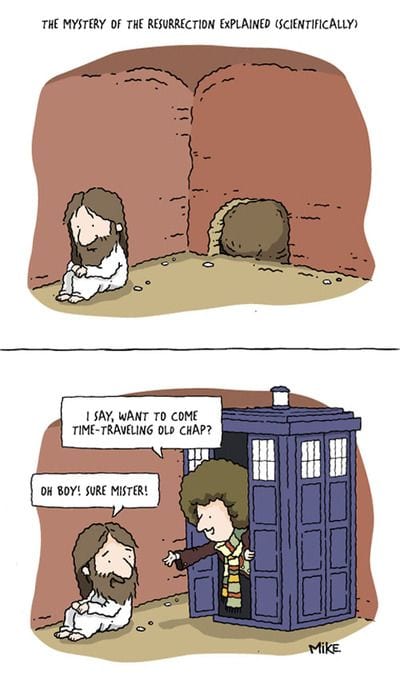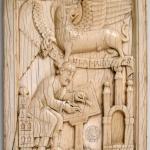I am writing this reflection for the benefit of students in Prof. Maria Doerfler’s seminar on religion and science fiction at Yale, where I will be making a guest appearance, but am also sharing it here since I think it will be of interest to blog readers as well. The theme for the day provides a fantastic opportunity to explore the points of intersection and overlap among a number of interests of mine, which are more directly related that I think some people realize.
There has been a lot of historical fiction created around the story of Jesus. Some of it is quite ancient, and indeed some of it is found within the New Testament itself. What is the genre of the Matthean infancy narrative, for instance? Historical fiction, or fantasy? I had someone ask me in a blog comment once whether anyone had explored the possibility that the Magi were historical figures, but were spies sent from Parthia to stir up trouble in Herod’s kingdom. My response was that no one had done so to my knowledge, but it was a great idea for a story! I’ve written it but have yet to publish it. Is it alternative history, or merely historical fiction? It isn’t science fiction, but the same cannot be said for Chris DeBurgh’s song “A Spaceman Came Traveling”:
It is Christmas with science fiction (emulated more than a decade later by Keith Emerson on his Christmas album). DeBurgh’s introduction of a space traveler into the infancy story might seem like not only science fiction but historical revisionism. Yet a spaceship could hover over a house and point it out, whereas a literal star could not do that, appearing to be directly overhead to such a wide stretch of our planet that even the brief error of the Magi in The Life of Brian brings them implausibly closer to the right place than any star could. Angels were among the celestial beings thought to populate the celestial realms where now we locate planets, and so inserting aliens into stories that feature aliens is not as far of a stretch as might first appear to be the case.
Doctor Who provides a brief throwaway comment about the first Christmas as well as the original Easter, which are interesting for the contrast between them:
In the one instance, the story happens as per the traditional version, and the Doctor’s presence contributes to causing it to unfold that way as he “got the last room.” From a scholar’s perspective, the inn is a misunderstanding since mangers were to be found in households, and so Doctor Who is closer to the commonly-told Christmas story than is what academics interested in the cultural and historical context understand the story to indicate. Moreover, from a historian’s perspective, Luke’s infancy story with its manger and angels is at best not the kind of story historians can comment on, and in the judgment of some inherently more likely to be symbolic and fictional in character. In science fiction, time travelers and space explorers sometimes encounter real beings that correspond to humanity’s gods–whether Apollo on Star Trek or the multitude featured in Stargate. That literalism (even if often accompanied with the insistence that the beings in question are “not gods”) is not something one would find in any modern department of ancient history or Classics.
 In the other Doctor Who reference, to Easter, the approach may sound more overtly revisionist: “what really happened is…” Yet competing suggestions (that Jesus was raised by God, that the disciples went to the wrong tomb, that the disciples stole the body, that the Romans threw the body to the dogs, and the list goes on) are to be found throughout ancient literature and modern explorations that claim to be either history or fiction. The division between those two categories is blurry, and approaching the story of Jesus through the lens of science fiction allows that to come into sharper focus.
In the other Doctor Who reference, to Easter, the approach may sound more overtly revisionist: “what really happened is…” Yet competing suggestions (that Jesus was raised by God, that the disciples went to the wrong tomb, that the disciples stole the body, that the Romans threw the body to the dogs, and the list goes on) are to be found throughout ancient literature and modern explorations that claim to be either history or fiction. The division between those two categories is blurry, and approaching the story of Jesus through the lens of science fiction allows that to come into sharper focus.
In “Let’s Go To Golgotha” Garry Kilworth focuses in on a puzzling element of the passion narrative for historians. There is no plausible reason why crowds of ancient Jews would have actively sought the death of one of their own at the hands of Roman authority. That the culprits were time travelers acting out the script they were given may be far fetched, but so is the story in the Gospels. Many people who think about both time travel and Christianity would go to visit a few days later, waiting outside a particular tomb to see if anything interesting happens. My own short story “Certainty” is about that scenario, and it was inspired by a thought experiment that was presented to me by an atheist who entered into a conversation with me on my blog. He asked me, if I had a time and space machine and could go any time and any place, what could I potentially see that could shake my faith. The thought experiment is a useful one, as it gets at the question of the falsifiability or otherwise of our beliefs–one of the things that drives not only historical investigation but also at times historical revisionism.
In Ken MacLeod’s “Jesus Christ, Reanimator,” the setting is the future, but without time travel to the past. The Book of Revelation is also widely viewed as being about the future, the “second coming,” even if some parts that may have envisaged the author’s future in the context of the Roman Empire scarcely transfer well to being about something that is still future to us. The Left Behind series is categorized by Amazon as science fiction. This gives us a chance to think about how stories about the future should be understood, as categories of satire, speculation, apocalyptic, prophecy, and sci-fi overlap and intersect. Ray Bradbury’s “The Man” and “The Messiah” both provide other encounters with someone who might or might not be the elusive figure of Christ in a future context.
A story like Gore Vidal’s Live from Golgotha, when added alongside these others, raises questions about its genre. Is it historical fiction, satirical spoof, a science fiction time travel tale, revisionism/alternative history, a little of each, or sometimes one or the other? How do science fiction, historical fiction, and works that could be either or both help us to think about the nature of history and historical investigation, the role of storytelling and creativity in thinking about and reconstructing the past, and other important topics that are relevant to us all (and not just to those who are fans of sci-fi and/or Christian literature)?
Of related interest for blog readers, here are some links related to historical fiction that may also be of interest, including mentions of several recent works of historical fiction by scholars of the New Testament that I hope to read and blog about in the near future. But first, let me mention that there is a Historical Fictions Research Network that has issued a call for papers. Let me also direct attention to Steve Wiggins’ post on the blurriness of the distinction between fiction and nonfiction.
On history and storytelling:
https://thewayofimprovement.com/2020/07/29/ed-ayers-the-past-cant-be-reduced-to-static-variables-and-predictable-outcomes/
I am looking forward to reading Chris Stanley’s novels set in New Testament times. Stanley is a professor at St. Bonaventure.
https://ehrmanblog.org/relevant-publications-by-blog-members-7-9-20/
http://www.wilgafney.com/2020/07/26/priscilla-pastor-preacher-apostle/













